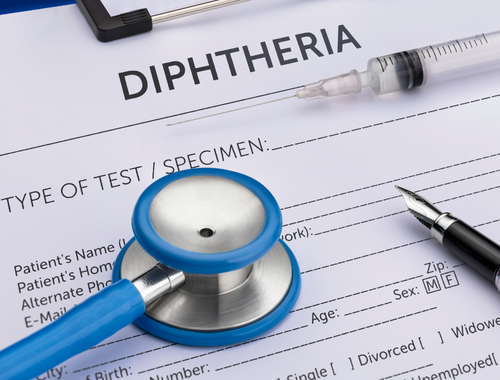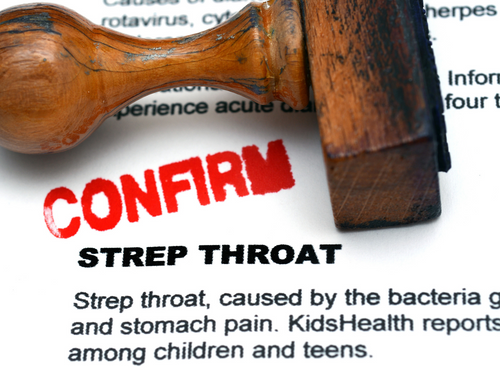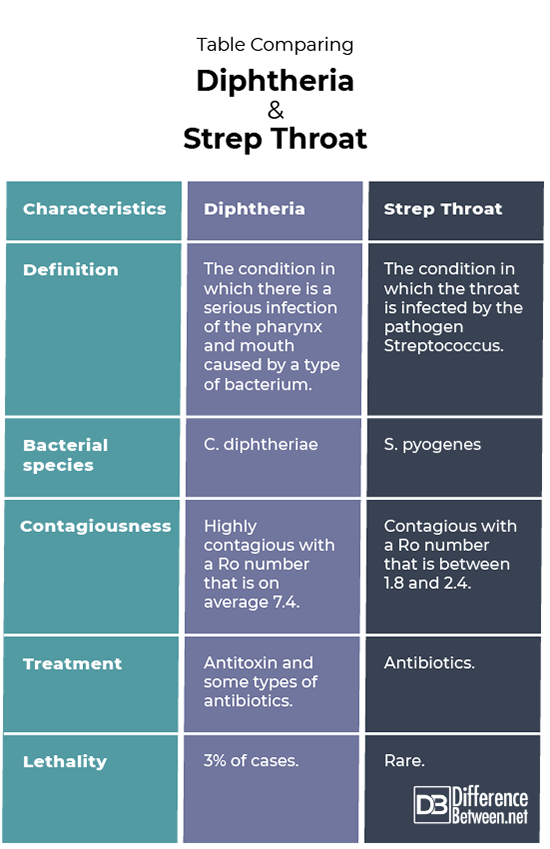Difference Between Diphtheria and Strep Throat
Diphtheria is a bacterial infection of the throat and nasal cavities. Strep throat is a throat infection that is due to Streptococcus bacteria.

What is Diphtheria?
Definition:
Diphtheria is an illness of the nose and also the throat; it is due to a particular type of bacterium called Corynebacterium.
Causes and prevalence:
The illness is caused by the Corynebacterium bacterium and it is rare in countries where immunization is common against the bacterium. However, diphtheria is still endemic in some parts of the world such as parts of Asia, the middle east, and eastern Europe.
Symptoms:
Signs you are sick include dysphagia, sore throat, low-grade fever, and tachycardia. Another sign of diphtheria is the presence of a grey membrane in the mouth and throat, which bleeds if detached.
Complications:
The membrane caused by diphtheria can block the throat completely. Mild illness can occur where there is irritation of both the throat and nose. However, the disease is dangerous with a mortality of 3%.
Diagnosis:
Diagnosis is often by physical exam where a doctor notes the symptoms, specifically the membrane in the mouth and throat. The Corynebacterium genome can be searched for using PCR. Bacteria can also be cultured in the lab from a swab taken from the throat.
Treatment:
Many people avoid infection by being vaccinated against the diphtheria bacteria. Antibiotics like penicillin or erythromycin are used where there is infection. People allergic to penicillin are often given erythromycin.

What is Strep Throat?
Definition:
Strep throat is also known as strep pharyngitis and is when there is an infection of the throat by Streptococcus bacteria.
Causes and prevalence:
Streptococcus pyogenes is the bacterium responsible for causing strep throat. The condition is most common in children. Strep throat makes up approximately 1/3 of all cases of pediatric sore throats. It does occur in adults at a rate of about 10% to 15%.
Symptoms:
The signs that a person has strep throat include a sore throat and small red dots on the back of the palate. There may also be nausea and vomiting, fever, headache, sore joints, and swollen tonsils.
Complications:
Strep throat can cause dangerous complications if the infection is not treated properly. The most common complications of strep throat are glomerulonephritis (kidney inflammation), and rheumatic fever, which affects the joints and heart.
Diagnosis:
Strep throat can be tentatively diagnosed by the physical symptoms, particularly the red dots on the back of the palate. Confirmation can be made by a rapid antigen detection test (RADT), or even by taking a throat culture and growing out the bacteria.
Treatment:
Strep throat can be treated using clindamycin,amoxicillin or, penicillin. Clindamycin is often chosen for people who have a penicillin allergy.
Difference between Diphtheria and Strep throat?
Definition
Diphtheria is when there is a specific type of bacteria infecting the pharynx and oral cavity. Strep throat is when the pharynx is infected with particular Streptococcus bacteria.
Bacterial species
Diphtheria is caused by Corynebacterium diphtheriae. Strep throat is caused by Streptococcus pyogenes.
Contagiousness
Diphtheria is a highly contagious disease with the Ro number being on average 7.4 (i.e., each person that has the illness infects about another 7 people on average). Strep throat is contagious with about 1.8 to 2.4 being the Ro number.
Treatment
The treatment for diphtheria is the use of antibiotics and medicine to combat the toxins the bacteria release. The treatment for strep throat is the use of antibiotics such as clindamycin or penicillin.
Lethality
The death rate from diphtheria is quite high at 3% of cases. It is rare that someone would die from a strep throat infection but the risk of complications is high if untreated.
Table comparing Diphtheria and Strep throat

Summary of Diphtheria Vs. Strep throat
- Strep throat and diphtheria are both bacterial infections affecting the pharynx.
- Diphtheria is a dangerous illness but most people recover easily from strep throat.
- Strep throat should be treated with antibiotics because dangerous complications can sometimes occur.
FAQ
Is strep throat the same as diphtheria?
Strep throat also causes a sore throat like diphtheria does, however, a totally different bacterium is responsible. Strep throat is caused by Streptococcus bacteria.
Is diphtheria caused by strep?
Diphtheria is caused by a different type of bacterial species when compared with strep.
What does diphtheria throat look like?
A person with diphtheria has a greyish membrane in the back of the throat.
What can be mistaken for strep throat?
There are other causes of a sore throat such as Covid-19, the flu, and tonsillitis, that can all be initially mistaken for strep throat.
What diphtheria smells like?
Diphtheria is said to have a characteristic odor described as sweetish.
Will strep go away on its own?
Strep can go away on its own in a couple of days but there are dangerous complications with this infection, so a doctor’s visit is a good idea.
What does the beginning of strep throat look like?
The first symptom is a painful throat that begins very suddenly.
Can you get rid of strep throat without antibiotics?
Strep throat can go away in a week even without using antibiotics. However, the use of antibiotics can shorten the infection, reduce how contagious you are, and decrease the risk of complications.
- Difference Between Rumination and Regurgitation - June 13, 2024
- Difference Between Pyelectasis and Hydronephrosis - June 4, 2024
- Difference Between Cellulitis and Erysipelas - June 1, 2024
Search DifferenceBetween.net :
Leave a Response
References :
[0]Ashurst, John V., and Laura Edgerley-Gibb. "Streptococcal pharyngitis." NIH, 2018, https://www.ncbi.nlm.nih.gov/books/NBK525997/
[1]Bisno, Alan L., Garnet S. Peter, and Edward L. Kaplan. "Diagnosis of strep throat in adults: are clinical criteria really good enough?" Clinical infectious diseases 35.2 (2002): 126-129.
[2]Bush, Larry M. and Maria T. Vasquez-Pertejo. “Diphtheria.” Merckmanuals. Merck & Co., https://www.msdmanuals.com/professional/infectious-diseases/gram-positive-bacilli/diphtheria
